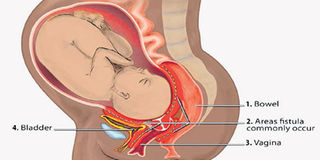She leaks urine but has not given up on life

An illustration showing the common sites of fistula occurence.PHOTO|THE GUARDIAN, NIGERIA
What you need to know:
- When we met at Kawempe General Hospital where the Mulago Hospital obstetrics and gynaecology department has since shifted; you cannot tell that she is leaking until she tells you so.
It is close to a year since Phionah Nalubwama, 26, had an obstetrics fistula during the birth of her second child. Given her experience, she left her once desirable journalism career to switch to advocacy as a fistula ambassador identifying with victims and sensitising young girls and women in communities about the condition.
When we met at Kawempe General Hospital where the Mulago Hospital obstetrics and gynaecology department has since shifted; you cannot tell that she is leaking until she tells you so.
How it happened?
The pain she went through the fateful Friday night she delivered her baby is “unimaginable.”
Unlike her first normal delivery at the age of 17, Nalubwama was identified during her second pregnancy as one of those mothers who could not push out her baby.
The doctors recommended a caesarean section. “The baby was 4.2kilogrammes and doctors said I would not be able to push,” Nalubwama shares on how she ended up at Mulago hospital for a C-section on the fateful day.
Although her name got onto the theatre list on time, being a referral hospital with only two operating beds, there were some delays as patients in worse conditions trekked in.
In order to save their lives, the doctors took a hard decision to attend to them first leaving, the rest of the women already in labour to wait. “I was already in labour. The baby’s head started forcing its way out,” the former journalist recalls, adding that “it was too late to carry out an operation on me.” Instead, the doctors, she says, were forced to use some instruments to force out the baby, who was already on its way.
“The pain was severe. That is when I stopped feeling my thighs and legs. The next thing; I could not control the flow of urine and stool anymore,” she recollects.
Having stayed in hospital for days, Nalubwama, was discharged and could only return to hospital as an outpatient for review with the doctors hoping that the condition would be short-lived.
“By then, I was using a wheelchair,” she says. It is when she reached home that she realised she was leaking. The doctors revealed that she had developed fistula.
Nalubwama hoped for a quick recovery and returning to work after a short period of time. Little did she know her condition was complex. After several surgeries at Mulago hospital, the paralysis slowly disappeared, except for her left limb, the reason she limps to date.
Fistula there to stay
Doctors resorted to other coping mechanisms that involve using pampers and catheters to keep her dry.
“I had to accept my condition and chose to become a fistula advocate,” she states. But her worst days were yet to come with the change of her life style. The urine flow worsens whenever she laughs, coughs or carries heavy objects.
Although she was asked to take fluids in large quantities to dissolve the urine and prevent a bad odour and infections, it causes the urine to flow irrepressibly.
As a result, she ends up embarrassed when the urine flows out of the diapers breeding harassment on several occasions.
At one time, she sat on a boda boda when the catheter got full, splashed and wetted the motorcyclist who responded by hurling insults at her.
The second incident could even cause more shame when the catheter splashed in a taxi and caused a scene.
“The other passengers quarreled and the conductor withheld my change claiming that he had to wash the car,” she says.
But the worst stigma she has faced is when she was abandoned by her own husband when he realised that her illness may never heal.
Expert view
Dr Haruna Mwanje, a gynaecologist and fistula surgeon at Mulago hospital handling Nalubwama’s condition says the delivery process left her bladder and pelvic muscles damaged.
“The muscles which are supposed to fix the foot in the same place were all destroyed,”Dr Mwanje explains why she is limping.
He explains that: “During the child birth as the baby is coming out through the birth canal, the baby’s head will compress the soft tissue around it which when entrapped into two hard bones, it will get damaged.” As a result, Dr Mwanje states that a hole forms into a fistula.
There are so many tissues around the birth canal which range from simple to complex and the more complex they get, the harder for the patient to get better, he says.
Although simple fistula damages are treatable and the patient gets better, Nalubwama’s condition is complex.
“For her case, the damage was quite significant. Fortunately her bladder did not get a hole but got what we call neurogenic bladder,” Dr Mwanje adds.
Having been damaged, the bladder he says, can no longer detect that it is full “and we are also giving it time for the surgery to regenerate.”
“If we try to correct a bladder and it cannot then we do other things say the surgeries. We can make the urine go somewhere else say the rectum or create another bladder and she can control it herself but as long as the patient is dry,” he adds.



